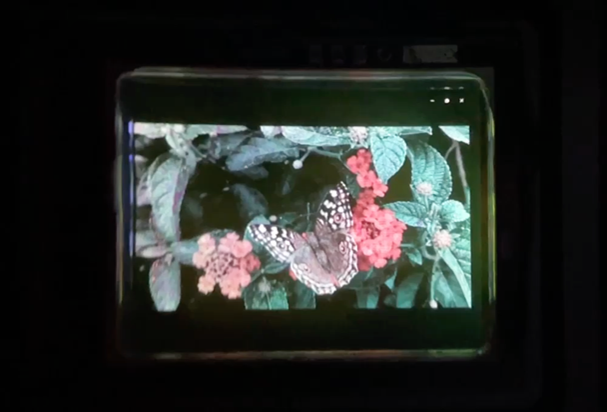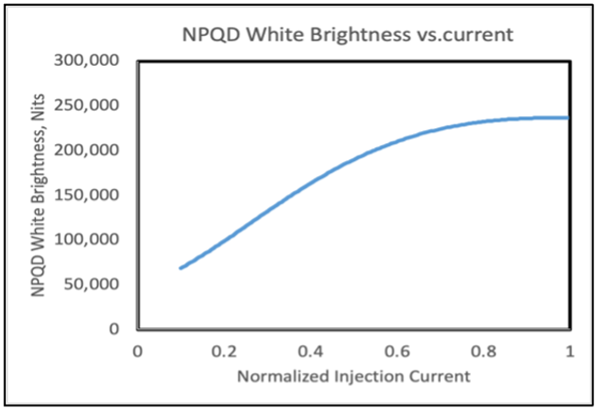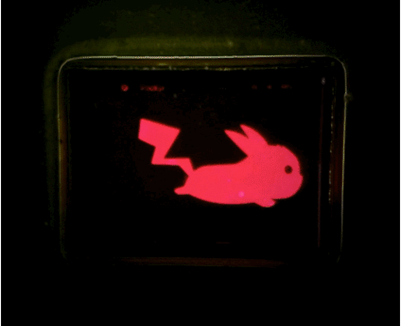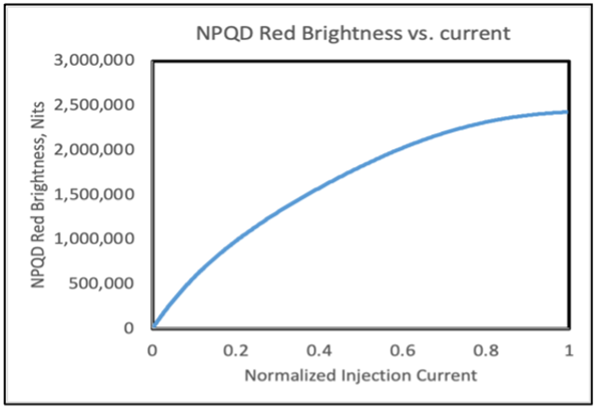SAN DIEGO--Saphlux today demonstrated an industry leading 0.39” full-color micro-LED display (T1-0.39 RGB) that will enable virtual reality (VR) and augmented reality (AR) manufacturers to create true outdoor-compatible brightness and high-resolution display systems with color rich image quality (Figure 1).

Figure 1: Prototype T1-0.39 NPQD® RGB Light Engine
“Light engines offering wide ranges of brightness, contrast, and color i.e., high dynamic range (HDR) within the power, thermal, and form-factor constraints is the biggest challenge for the AR/VR headsets. In lab testing, the 0.39” RGB NPQD® prototype delivers maximum white brightness of 250,000 Nits (Figure 2) and wide color gamut with the novel approach of incorporating Red and Green QDs into nanopores in GaN (NPQD®),” said Saphlux CEO Dr. Chen Chen. “More importantly, combining the ground-breaking 67% photon conversion efficiency of NPQD® and the existing high EQE blue micro-LEDs (mLED) from partners, the T1 solution provides a breakthrough performance compared to current micro-OLEDs and LCOS alternatives. This is our first step towards the goal of opening up a whole new world of AR/VR realistic visual experiences in personal computing, gaming and social interactions.”

Figure 2: T1-0.39 NPQD® White Brightness
Saphlux used its proprietary NPQD® process for red and green QD conversion of blue GaN mLEDs at pixel pitches of sub-2 microns along with blue mLEDs on the same substrate achieving brilliant full color monolithic light-engines. Saphlux’s proven NPQD® mLED technology is ahead of its competition, providing the high-resolution and energy-efficient integrated RGB light-engine that enables AR/VR solutions.
Incredible red brightness, efficiency, and color with NPQD®
Saphlux’s scalable NPQD® architecture captures high percentage of blue photons and converts them into narrow red resulting in higher red mLED efficiency than incumbent efficiency of AlInGaP-based mLED at use conditions. It also exhibits lower thermal decay with temperature. Saphlux offers a true red vibrancy at a pitch pixel of sub-2 microns and at ~625 nanometers red wavelength with 22nm FWHM. In the future, this building block mLED technology will deliver the full potential of HDR and 100% of Rec-2020 gamut that are required in consumer displays.
Addressing the “red problem” in three colors combiner AR display solutions today
“AR glasses need to offer adequate in-eye nits for high volume adoption but are limited by Red mLED performance. Saphlux has solved the fundamental problems plaguing the efficiency & reliability of Red mLED with NPQD®,” said Saphlux CEO Dr. Chen Chen. “We are already shipping high volume NPQD® based Red mLEDs into Public Information Displays. This proven NPQD® technology will set a new standard in AR brightness and kick-off AR solutions for consumers.”
Saphlux’s approach is to use the best available monochromatic mLED engines i.e., T1-0.12 Red based on NPQD® technology, T1-0.12 Green and Blue based on InGaN green and blue mLEDs from partners to create innovative AR solutions (Figure 3). This approach allows significant flexibility for OEMs design trade-offs in terms of optics, brightness, weight, finally the look and feel of AR glasses.

Figure 3: Prototype T1-0.12 NPQD® Red light engine
“Current T1-0.12 NPQD® Red can deliver max brightness of 2 million Nits @ >6000 ppi (Figure 4). Further optimization is needed to realize full potential of NPQD® technology that will deliver never before possible brightness and unleash the AR market,” highlighted Dr. Jie Song, VP of Technology at Saphlux. “We expect to start shipping T1-0.12 Red products starting Q4 this year. The unique NPQD® approach seamlessly integrates with existing high EQE blue mLED and CMOS manufacturing. This allows customers to either purchase Saphlux T1 solution or use their own blue micro-LED and couple with Saphlux NPQD® to create light engines. Saphlux welcomes partners to synergically create AR solutions.”

Figure 4: Red NPQD® 2µm Array Brightness
This breakthrough innovation makes Saphlux your partner of choice for the light engine in AR applications. Together, let us create the next consumer revolution and make smart glasses part of our everyday lives.
TrendForce 2023 Micro LED Market Trend and Technology Cost Analysis
Release Date: 31 May / 30 November 2023
Language: Traditional Chinese / English
Format: PDF
Page: 160 / Year
【Early Bird Discount】Micro LED: Metaverse X Technological Evolution X Application Innovation
Time:September 5th, 2023
Venue:Room 401, National Taiwan University Hospital International Convention Center, Taipei, Taiwan.
Price:Early Bird Discount USD 230 (until August 25th, 2023, the original price is USD 280)
|
If you would like to know more details , please contact:
|















